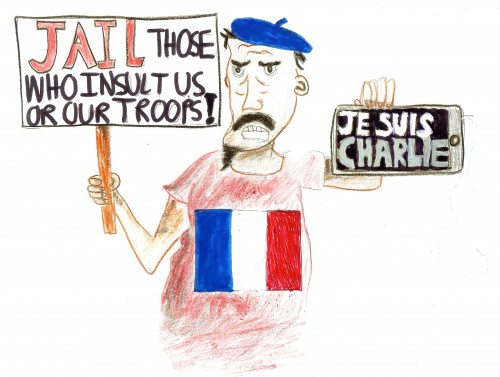
The attack on the satirical newspaper, Charlie Hebdo, will live on in infamy. It was a horrible and unjustified act of terror that was perpetrated on people who simply exercised their right to publish an opinion. What is more troubling is that many people, especially journalists, who have openly criticized of certain groups in the past are now censoring themselves out of fear.
Charlie Hebdo published profane material. The magazine pushed the boundaries for what is deemed socially acceptable or politically correct and because of this, they have hurt many people. Voltaire once said, “I do not agree with what you have to say, but I will defend to the death your right to say it.” While this is somewhat of a cliché, it seems to embody the exact sentiment of those who understand the importance of the First Amendment. The magazine’s views on Islam are disgusting, as they wrapped up every single Muslim in the same blanket of violent radicalism. However, their right to free speech should be upheld nonetheless.
It is irrelevant what anyone thinks about what they had to say because the right to free speech cannot and should not be suppressed— by any means and at any cost. The very existence of the First Amendment is to protect speech that is frowned upon by those in power or by the majority of society, for if that is not its purpose, there would be no need for it. What if Mark Twain was not able to publish The Adventures of Huckleberry Finn because his opinion on the issue of racial equality was unpopular at the time? What if Vietnam War protesters were prevented from voicing their concerns early on in the war because it was “unpatriotic” to do so?
If the range of speech we are allowed to engage in is limited, human progress will forever be inhibited as the status quo will be perpetually enforced. The challenge to orthodoxy and the promoter of progress is naturally speech which society deems “radical” or “insensitive” for its time. We, as a society, seem to know this and advocate, at least with our words, the importance of the First Amendment. In fact, the U.S. justice system has repeatedly recognized the right of Klu Klux Klan members to engage in hateful speech directed at certain groups of people, speech that even supports terrorist acts in some cases. This phenomenon presented itself in the Brandenburg vs. Ohio Supreme Court decision, which ruled that KKK members had the right to claim they would enact “vengeance against blacks and Jews.” Again, the decision to uphold the principle of free speech should be commended, not the particular speech in question.
However, it seems that we have lost the way, as restrictions are being placed on certain speech solely on the basis that they criticize those who regulate speech in a society.
It is appalling that people have turned the “Je Suis Charlie” movement, which advocates “free speech”, into a sort of purging that does exactly the opposite, to suppress speech that they do not like.
Following the attacks, over 100 French Muslims were arrested on “suspicion of terrorism” for making posts on social media that were critical of the West and its policies in the Middle East that were anti-semitic, or glorified terrorism. This is not a limited phenomenon. People in the U.S., United Kingdom, and France have been arrested on that same charge for more than a decade for posting such things as “all soldiers are going to hell” or other hate speech directed at the West.
However, anti-Muslim speech, which is at an all time high, has been consistently overlooked and even supported. It is becoming increasingly illegal in western countries to support terrorism or use hateful speech. However, it is clear that the ability to engage in hate speech all depends on the group of people that is being derided.
As mentioned earlier, the KKK is regularly protected by our government to engage in hate speech. At times, the group explicitly threatens to kill black people and their supporters. After the Ferguson decision, the KKK threatened to use lethal force against any protesters who marched. Wouldn’t that be a threat of terrorism and therefore illegal?
After the attack, a large amount of anti-Muslim speech was visible online and in the media. One comment that appeared on Fox News, a conservative news network, was that the only solution to “jihadist cancer” is to “stop being politically correct and kill them all,” referring to all Muslims. Unsurprisingly, the comment was not met with much opposition in the U.S. Wouldn’t saying that we should kill all Muslims be a clear and directive threat? Wouldn’t it also fall under the category of supporting terrorism?
Nevertheless, people are championing the phrase “Je suis Charlie” and “free speech” and then criminalizing speech that is critical of their own beliefs. That is because “free speech” in the eyes of many Westerners means: it is essential that the groups of people that I myself dislike are able to be satirized, but speech that criticizes me or my government will not be tolerated. In other words, threats of terrorism towards all Muslims will be allowed and even supported in some cases, but support for terrorist threats against western governments or even just borderline criticism of them will not be.
We as students living in a tolerant community should understand establishment hypocrisy when we see it and aim to fix it. If threats of terrorism or support for terrorism is not condoned by a society, then all threats of or support for terrorism should be outlawed. However, if a society believes that all speech, even hate speech like the cartoons of Charlie Hebdo, should be facilitated, then all hate speech, not just the kind that is okay with the majority or the powerful, should be facilitated.







